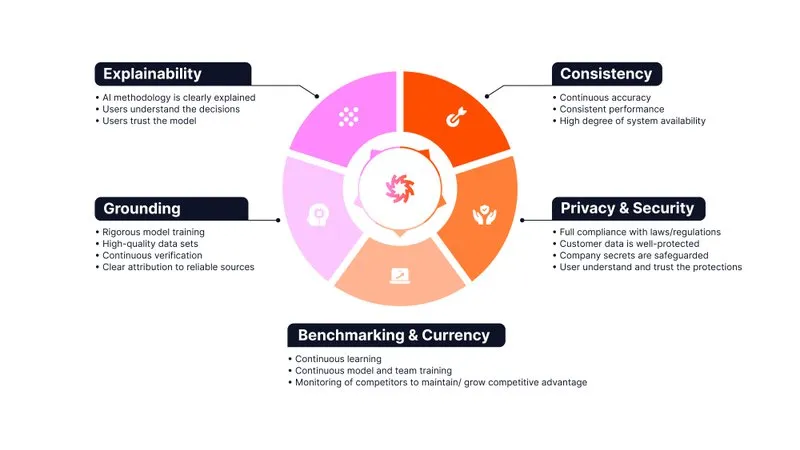

Want to know why AI reliability matters so much? Imagine this: a financial institution deploys an AI-powered loan approval system. Initially, it seems to work flawlessly, streamlining processes and speeding up approvals.
However, over time, inconsistencies begin to surface.
How do you think this impacts executive commitment to AI transformation? Consumer loyalty to the bank? The bottom line? The system, conceived as a way to enhance efficiency and customer experience, now breeds lost revenue, increased financial risk, distrust and potential legal liabilities.
This cautionary tale illustrates the critical need for reliability excellence in AI.
Problems like this are all too real and they aren’t confined to the financial services sector. Here are just a few real-world examples of companies that suffered significant problems as a result of unreliable AI solutions:
While the buzz around artificial intelligence is undeniable, actually making it happen can also instill fear in business leaders who read “disaster stories” like those above. Amidst the excitement, a nagging question persists: can we deploy AI solutions that embody the reliability and dependability that are critical to achieving our larger goals for AI transformation?
Naturally, there is a lot of specific technical knowledge required to deliver an effective AI solution. We focus on a business model that combines human experts and agentic AI to enable you to capitalize on AI across your organization without having to build a large internal AI and data science team. However, as a decision-maker, it’s important for you to have a conceptual understanding of AI best practices so you can ensure that the solutions you deploy deliver maximum value to your organization. This post will explain those key concepts in language designed for the generalist executive.

AI solutions must be anchored in verifiable reality. Think of it as ensuring your AI isn't living in a fantasy world. We've all heard stories of AI "hallucinations," where models invent facts or confidently assert falsehoods. This can lead to serious errors and erode user trust.
Grounding AI involves three core elements:
Companies that deliver Grounded AI are far more likely to gain the transformation benefits we all want for our businesses. Here are some examples of companies that did get it right:


Explainable Artificial Intelligence (XAI) us all about ensuring that the people who use the solution understand and trust the results and outputs. This is crucial for building confidence when crafting system design and deploying AI models into production environments. By providing insights into how AI arrives at its conclusions, XAI delivers transparency.
XAI is also essential to ensure legal and regulatory compliance in AI system design, especially in highly regulated industries like finance and healthcare and in regions with privacy regulations like the EU. Your AI development methodology should be established with explainability by design.
Here are three examples that underscore the value of Explainability:
Consistency is about ensuring AI performs predictably and dependably over time, even as it scales to handle increasing workloads. Inconsistent AI can lead to inappropriate system functionality and erratic behavior and fluctuating performance, making it difficult for businesses to rely on it for mission-critical tasks. Maintaining consistency requires robust model design, comprehensive testing, and continuous monitoring.
A great example of the importance of consistency comes from the ecommerce space. Imagine an e-commerce platform using AI to personalize product recommendations. If the recommendations become less accurate over time, customers will fail to consider them and may even move to buying from a competitor that can deliver more value.
Another comes from the arena of predictive maintenance. If you deploy an AI solution to help prevent manufacturing or service failures, inconsistent AI can cause more problems than it solves. You could be engaging in unnecessary maintenance activities or failing to detect indications of potential catastrophic failure.
Almost every business collects, processes, and leverages vast amounts of customer information – much of it extremely private in nature. Business also have their own methodologies and competitive advantages – the intellectual property (IP) that helps them deliver extraordinary value. Protecting this data is essential for both compliance and customer trust.

Private AI and secure AI ensures that data remains confidential. Techniques like data encryption and anonymization further enhance security and are critical for AI reliability. Here’s how that comes into play in a couple of highly regulated industries:
One of the most important attributes of a strong AI solution is continuous improvement. The AI landscape is constantly evolving, with new models and techniques emerging regularly.
Benchmarking involves systematically evaluating and comparing AI models to ensure they utilize state-of-the-art technology.
Great AI solutions incorporate continuous learning and retraining to maintain and enhance AI model accuracy rates and effectiveness over time. This ensures that AI systems adapt to changing data patterns and remain relevant.
Let me provide just a couple of examples of why continuous learning and improvement are so important:
Competitive benchmarking: AI applications are increasingly a key lament of a company’s competitive advantage. Companies that stay abreast of the latest advances and developments in AI, and reflect those in their tools, maintain and enhance their competitive advantage. Those that don’t update and improve their solutions can quickly fall behind and lose their edge.
Natural language processing models are constantly improving as systems ingest more data, find more language patterns and connections, and adapt to changing consumer usage. By constantly enhancing natural language capabilities, you can keep customer-facing experiences relevant and make them progressively easier to use. Similarly, AI applications that are used by “laypeople” within your company also need constant learning.
Recommendations engines are greatly enhanced when they reflect the latest shopping patterns and preferences of consumers. In ecommerce, current AI can leverage insights on “hot” items to deliver more appealing upsell and cross sell suggestions.
The buck stops with you. As a leader, you are responsible for ensuring that your company gains maximum benefit and ROI from AI initiatives. You are also responsible for ensuring that your AI initiatives don’t bring inaccurate information, reputational damage, and legal risk.
If you’re reading this post, you’re probably not a data scientist. Your expertise is in your respective function and industry. By understanding AI reliability and the framework for delivering it, you can help guide your company’s AI development decisions with greater confidence.
At RapidCanvas, we understand the critical importance of building trust in AI. Our methodology is deeply rooted in the five pillars of reliable AI.
We recognize that businesses need AI solutions they can depend on. That's why RapidCanvas goes beyond simply providing cutting-edge technology; we deliver AI with integrity. We believe that AI system trustworthiness is the cornerstone of successful AI adoption, and we're dedicated to helping businesses bridge the AI trust gap.
Our team would be delighted to meet with you to discuss your AI needs and the right way to develop and deploy transformational AI solutions. Our “human experts + Agentic AI model” provides the best and fastest approach to delivering the AI-powered solutions you need to drive measurable and meaningful ROI gains. Contact us for a consultation today. You can also read our AI Terms Crib Sheet for Non-Data Scientists.


